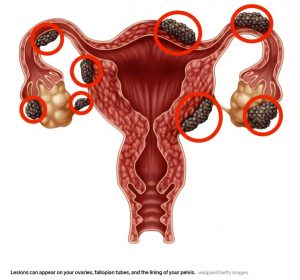Laparoscopic Excision of Endometriosis
Endometriosis is a long-term condition where tissue similar to the lining of the womb (endometrium) starts to grow in other places, such as the ovaries and the fallopian tubes, usually during menstruation. The condition can cause pain that is sometimes debilitating (especially during menstrual periods). Typical symptoms of endometriosis can include:
- Severe menstrual cramps
- Heavy and painful periods
- Severe back pain during your period
- Pain during and after sexual intercourse
- Recurrent fatigue
- Blood in your stool or urine
- Fertility problems
- Diarrhoea or constipation
While there is no known cure for endometriosis, there are treatments available to help shrink tissue growth and ease pain.
What is Laparoscopic Excision of Endometriosis?
A laparoscopy is a surgical procedure that is used to diagnose and treat various conditions, including endometriosis. It is usually performed under a general anaesthetic.
Laparoscopic excision of endometriosis is considered the most effective method of treatment for the condition. Other techniques have been found to be less effective in completely eradicating endometriosis, resulting in a recurrence of symptoms, with the possibility of further surgery being required.
Causes of Endometriosis
Although the cause of endometriosis is unknown, experts believe menstrual blood that contains endometrial cells may pass back through the fallopian tubes and into the pelvic cavity, where cells stick to the organs. This is known as retrograde menstruation. Other causes are believed to include:
- Immune system disorders
- Genetics
- Metaplasia (where one cell changes into a different type of cell)
Who is Suitable for the Procedure?
You are likely to be considered suitable for the procedure if:
- An abnormal mass, known as an ovarian endometrioma has been detected on your ovary
- You are experiencing severe adnominal pain, believed to be caused by endometriosis
- Endometriosis is believed to be causing infertility
- You are still experiencing symptoms following hormone therapy
- Endometriosis is interfering with other organs such as the bowel or bladder
For patients who are not considered suitable candidates for laparoscopic excision of endometriosis, hormone therapy may be recommended. This is a less invasive form of treatment.
Preparing for Surgery
Before undergoing laparoscopic excision of endometriosis, you will be required to attend a pre-assessment appointment to check you are fit enough to undergo surgery. In order to minimise the risk of complications, the following may be recommended:
- Stop smoking
- Maintain a healthy diet
- Maintain or start some form of exercise
- Lose weight if you are overweight
Undergoing Laparoscopic Excision of Endometriosis
Your surgeon will make a small incision in your abdomen near your belly button and fill it with gas, in order to see inside the abdomen more clearly. A laparoscope (a thin tube with a small camera and light on one end) will be inserted to look for endometriosis scarring and lesions around the surrounding organs. Tissue affected by endometriosis will be cut away in order to free the affected organs. This can include the following areas:
- Ovaries
- Fallopian tubes
- Ureters (tubes that carry urine from the kidneys to the bladder)
- Back and side of the uterus
- Bladder
- Perineum (space between the rectum and vagina)
Depending on the severity of your endometriosis, surgery can take between 30 minutes to 6 hours or more.
Once your surgery is complete, the incision will the closed with small stitches.
Post-Operative Recovery
Following surgery, you will be taken to the recovery room until the anaesthetic wears off. During the first 24 hours, you may feel more sleepy than usual.
You are likely to feel a level of discomfort after your procedure, although you will be prescribed medication for any pain you are experiencing. Typical post-operative symptoms include:
- Soreness in the abdomen
- Mild pain at the incision site
- Vaginal bleeding
- Mood swings
- Nausea and vomiting from the anaesthetic
- Discomfort caused by excess gas
You will be required to remain in hospital for 2 – 5 nights, depending on the extent of your surgery.
Upon discharge from hospital, your recovery will take approximately 4 – 6 weeks. You will need to take time off work as you will not be able to resume your regular activities for 1 – 2 weeks. You should be able to have a shower or bath a day after your operation, but be careful when washing the wound site and ensure the area is kept dry once you have finished to help the area heal well.
You should avoid certain activities following surgery. These include:
- Strenuous exercise
- Sexual intercourse
- Heavy lifting
- Stretching
- Bending
To help accelerate your recovery, you should try to incorporate the following:
- Eat a healthy diet that is high in fibre
- Drink plenty of water
- Get plenty of rest and sleep
- Keep the incision site clean and dry and out of the sun
- Perform gentle exercises to help eliminate excess gas
You will need to take regular medication to prevent the build-up of new endometriosis, unless you are trying to become pregnant.
Your first period following surgery is likely to be heavier and more painful than before your procedure. This is entirely normal, but contact your GP if the pain is severe and unmanageable with over the counter medication.
You can begin to have sex again 2 – 4 weeks after your surgery, but if you have any concerns, check with your healthcare professional first.
You will be required to attend a follow-up appointment approximately 2 – 6 weeks following your procedure.
Risks and Complications
Laparoscopic excision of endometriosis is considered a safe procedure, but as with any invasive surgery, it does carry some risks. These include:
- Bleeding
- Blood clots
- Adverse reaction to the anaesthetic
- Infection in the bladder, uterus or surrounding tissues
- Scarring
- Bowel, bladder or ureter damage
If you experience any of the below, contact your GP or call NHS 111 immediately:
- Severe abdominal pain
- Uncontrollable bleeding
- Abnormal vaginal discharge
- Increased pain at the incision site
- Nausea or vomiting that lasts longer than 2 days
- Red, painful discharge at the incision site
- Pain or burning when urinating
- A painful, red, hot and swollen leg
Outlook
Laparoscopic excision of endometriosis can reduce overall pain from your symptoms, but results may not be permanent and your endometriosis may return.
Need Help?
At One Healthcare we can arrange for you to see a specialist Gynaecology surgeon for an initial consultation, usually within 48 hours. Laparoscopic Excision of Endometriosis is available at One Ashford Hospital in Kent and One Hatfield Hospital in Hertfordshire.
You can use your private medical insurance or pay for your Laparoscopic Excision of Endometriosis treatment. We offer competitive, fixed price packages. If you are using your health insurance, please contact your insurer first for approval and let them know you’d like to be treated at One Hatfield Hospital.
Why One Hatfield
- Modern purpose-built hospital opened in December 2017
- Fast access to diagnostics including MRI, X-ray and Ultrasound
- Private, spacious, en-suite rooms
- Specialist physiotherapy and nursing teams
- Little or no waiting time
- ‘Ultra clean air’ theatres
- Freshly prepared food
- Calm, dignified experience
Contact us and find out more
If you are based in and around Hertfordshire, St Albans, Stevenage, Watford, North London, Welwyn or Bedfordshire and would like to visit the One Hatfield Hospital please click here.
Gynaecology Pricing Guide at One Hatfield Hospital
This is a list of guide prices for some of common Gynaecology treatments and procedures.
| Treatment | Guide Price from |
|---|---|
| Hysterectomy - abdominal | £7,825 |
| Hysterectomy - Vagina | £8,350 |
| Repair of Prolapsed Vagina | £7,222 |
| Colposcopy (outpatients) | £900 |




 One Ashford
One Ashford One Hatfield
One Hatfield